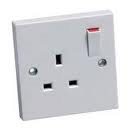Electricity in Tanzania is different than in America on several levels.
First of all, the power is 220 volts not 110 volts. Now, I really don't know what that means except to say that you can't use electric appliances from America with the electricity in Tanzania without using a transformer- unless it specifically says 110-220 volts on it.
The outlets are different here.
The shape of the plug that can fit into the outlet is different. So, even if your appliance is 110-220 volts, you would have to have an adapter to plug it into the wall. We usually use an extension cord that has the correct outlets on it. To confuse things even more, many appliances that you buy here are from China or South Africa which have a different plug again. So, our house has many types of adaptors.
Also, there is a power switch on the power outlets. You can switch off the power at the wall without unplugging the appliance, which is nice.
Another difference is that for some reason, all the light switches for the bathrooms are on the outside of the bathroom.
The red switch turns the instant hot water heater on both of the showers in our house. Most people here don't have hot water heaters, but the few that do usually only turn them on a little while before they want to use the hot water to save power. We have an instant hot water heater that heats the water as it comes of the shower. Unfortunately, we get shocked if we touch the tap while it is on, so we have to turn on the shower, then the heater, then after our shower, turn off the heater, and then turn off the water. Something is wrong with the grounding in the house, I think.
Another difference is that there are two types of light bulbs and sockets here:
 |
| Screw type light |
All the houses we've lived in here, which are many, have had both types of sockets in them. So, we have to have both type of light bulbs. Don't ask why.
The biggest difference though, is that we are often without power. It is rare for us to go a week without losing power for several hours. Right now, they are working on the power grid, so for 10 days we are without power for 24 hours, and with it for 12 hours, and so on.
Not being able to rely on power makes you modify things a bit. First of all, I have to have a gas stove/oven. That ensures that dinner won't be ruined if the power goes off while I'm cooking. We have a generator to recharge our phones and computers when they run low. I only let the kids have 1/2 hour of computer time a day, so they are used to entertaining themselves without power. They really don't notice it if we lose power during the day. We have candles and kerosene lanterns for nights if we don't want to run the generator.
Those are some of the differences between Tanzania and America when it comes to power. To be honest though, most people here don't have power at home. So, when there is a power outage, it doesn't affect them at all!


















